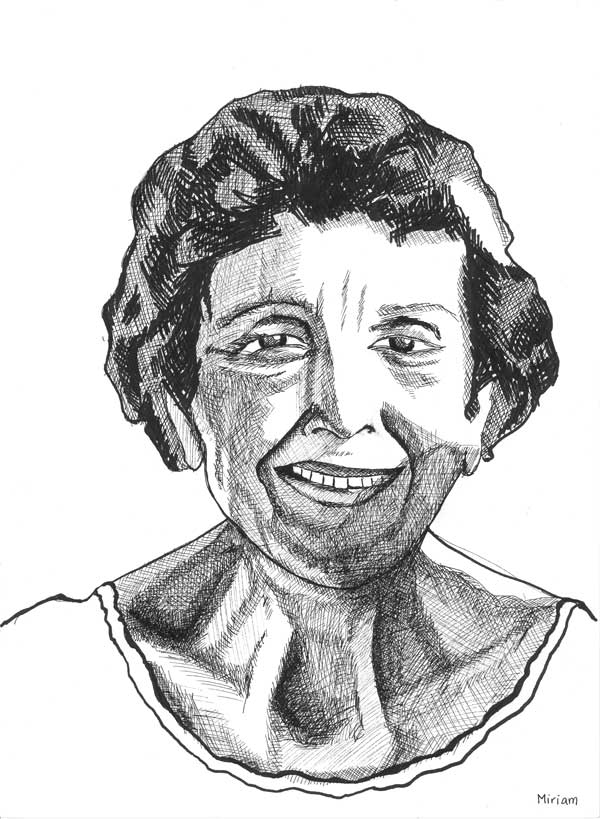MIRIAM: “ We are made up of the times we are born into … Keep old friends and make new ones — human relationships are the nuts and bolts of everyday life.”
I learn that the sensory is not a “frill,” a feminine indulgence or compensatory but the foundation of one’s life and memory …“There are no ideas separate from material reality. Human relationships grounded in the sensory activities of daily life are the sites of interest and meaning.”
The Nuts and Bolts of Everyday Life
I see Miriam every Thursday morning when the catch arrives fresh at the island’s fish house, a small grey shack tucked in a sheltered corner on the harbour shore. A short, attractive, older, grey-haired woman, she always smiles, and eventually we chat a little, and then, at my request, she shows me how to choose the best fish.
When we get to know each other better she tells me that she never knew when or how she would do something her sister or parents thought was wrong. She was an immigrant child of the Depression, and poor. Her father studied Torah and had to talk to girls (since there was no son). Her mother was breadwinner and homemaker, her older sister competitive and manipulative. She learned how to “mind her Ps and Qs,” watching every move they made, listening to their every word, learning empathy through “being attentive to the person” so that she could judge how to get her needs met … and satisfy the needs of others. By her teenage years she was an expert in human relationships, and she later became a dedicated and gifted teacher.
“You see, I was brought up to notice things, to watch people. Observation is something I do, have always done. It’s not thought, which is about ideas, it’s about the nuts and bolts of everyday life.” She watched all the ways her mother made a home and was brought up to expect that she should know these skills and so she doesn’t really know how she remembers them — “I just do it.” Even when she was a full-time teacher she provided the setting for weekly get-togethers of their friends who enjoyed the intellectual stimulation, as well as the good food she always provided.
These are the everyday small triumphs. But looking back over her 83 years Miriam is proudest of her educational achievements as a young woman, and of her long career teaching in New York’s public school system. She tells me that her mother “got us our education,” encouraging her daughters to go to college over their father’s objections that education was wasted on girls who would marry and raise children. Her mother’s life of drudgery had taught them all that education gives you the knowledge and ideas you need to qualify for a profession and make a good living so you wouldn’t be stuck at home the way she was. Her education and her profession also enabled her to be a feminist “because men don’t keep me, or keep me down. I’ve always worked. The other [homemaking] is just training, being in touch with people’s needs, and that’s observation.”
“It’s work, though, homemaking,” I say.
“Yeah, full-time, though it’s drudgery, a trap.”
“Boring — but you’re glad you are good at it.”
“Oh sure, it’s useful.”
“It’s taught you a lot: about organizing your life, about people, given you one of the ways to have a social life.”
“It has, but you know, there, I give to them. To give a lot is my way of winning. Teaching gave me that understanding.”
She smiles as she recalls her teaching days: teaching by rote, she says, “requires more skill than intelligence, and what you learn that way, if you don’t use it afterwards, you’ll forget the day after the exam.” She wanted her students to become excited about the material. She knows that her well-honed powers of observation allowed her to become aware of each child and to “understand what their needs were and how they could mesh with the curriculum.” Watching, listening, guiding, selecting, encouraging. As she grew in experience and competence, so did her self-confidence and her assertiveness. After the Second World War — during which many women had took on men’s civilian jobs — she faced postwar readjustments, including a typical woman’s struggle to keep a place in her profession.
The “continuous observation of people’s needs” is her life’s memory thread throughout a wary childhood and an “at-risk” teaching career. With age, Miriam is increasingly aware that while ideas and intellectual stimulation still matter to her, the relationships that she finds in nature, and with people, form the “nuts and bolts of everyday life.” Nature is never boring, never lets her down; the sensory is the basis of how she remembers and of memories — welcome and unwelcome. People can be tiresome and fatiguing, but they relight the spark of her lifelong curiosity — which helps her to keep on finding interests and meaning during the challenges and intensity of old age.
Miriam’s take on how to deal with troubling emotions, like anger, has become a family mantra: “Well, you learn to recognize it sooner, to put it in better perspective, and not let it bother you as much.”
I hope that I will reach the place where I can say, with her, that “feeling good is enough.” Stoic and serene in old age, she tells me, “I’ve lived long enough to know what I know: the language of the old faces reality, sees how people are unwitting victims of social and cultural conditions, made up of the times we are born into.”

